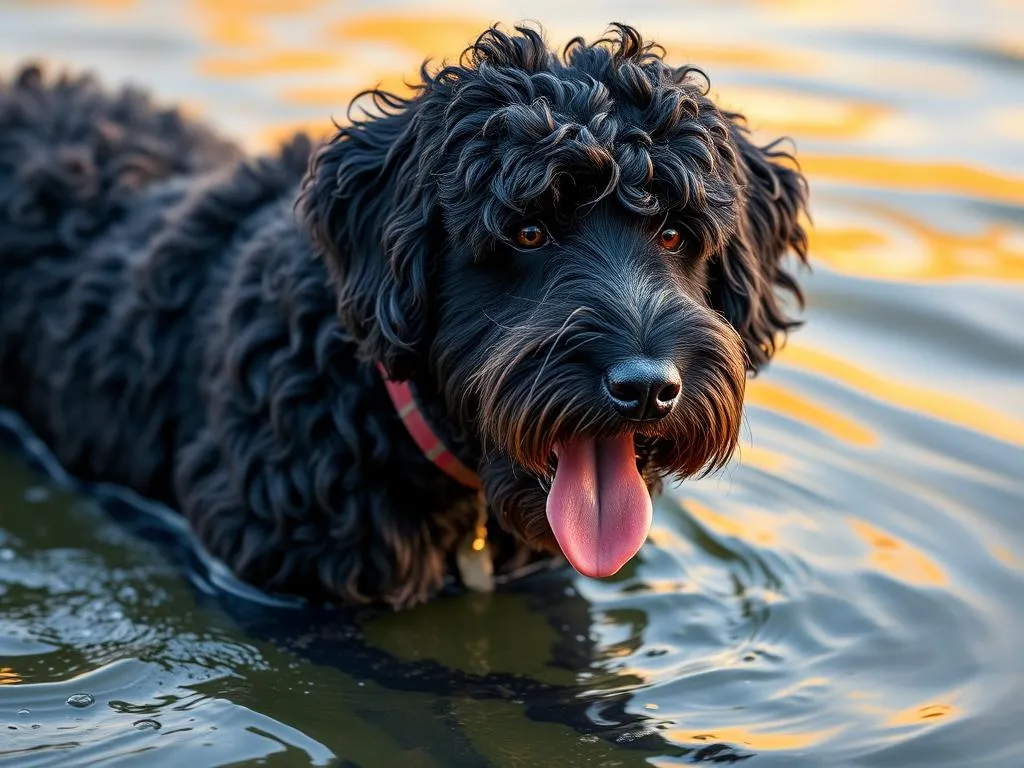
Introduction
The Portuguese Water Dog (PWD) is a breed with a rich history and unique characteristics that make it a beloved choice among dog enthusiasts. Known for their intelligence, versatility, and distinctive curly coat, these dogs have made their mark not only as reliable working companions but also as affectionate family pets. Understanding the traits, care, and suitability of PWDs can help potential owners make informed decisions.
Overview of the Portuguese Water Dog
Originating from the coastal waters of Portugal, the Portuguese Water Dog was historically bred to assist fishermen. Their keen intelligence and strong swimming ability made them invaluable companions on the water. Beyond their working capabilities, PWDs have developed a reputation as loyal family members, often forming close bonds with their human companions.
What to Expect in This Article
This article will explore a variety of Portuguese Water Dog facts, including their history, physical characteristics, temperament, health, training needs, grooming, and overall suitability for families. Whether you’re considering adding a PWD to your household or simply want to learn more about this fascinating breed, you’ll find valuable information here.
History of the Portuguese Water Dog
Origins and Ancestry
The Portuguese Water Dog has roots dating back to the 12th century, with historical references suggesting that they were bred in Portugal to assist fishermen in various tasks, such as retrieving fish, carrying messages between boats, and even diving to fetch gear. The breed is believed to be a descendant of various working water dogs, likely influenced by breeds such as the Barbet and the Irish Water Spaniel.
Recognition and Breeding
The Portuguese Water Dog was officially recognized by the American Kennel Club (AKC) in 1983, though their popularity surged in the late 20th century, especially following their association with notable public figures. Through selective breeding, enthusiasts have focused on enhancing the breed’s swimming ability, intelligence, and friendly disposition, making them not only exceptional working dogs but also cherished family pets.
Physical Characteristics
Size and Weight
PWDs are medium-sized dogs, with males typically weighing between 42 to 60 pounds and standing around 20 to 23 inches tall at the shoulder. Females tend to be slightly smaller, weighing 35 to 50 pounds and standing 17 to 21 inches tall. Their sturdy build and strong musculature contribute to their impressive swimming skills.
Coat Type and Color
One of the most recognizable features of the Portuguese Water Dog is its coat, which can be either curly or wavy. The coat is dense and water-resistant, a trait that aids them in their aquatic tasks. Common colors include black, white, brown, and combinations of these, with some dogs displaying unique markings.
Distinctive Features
PWDs are known for their webbed feet, which are designed for efficient swimming. Their expressive eyes and friendly demeanor add to their charm. The breed’s unique coat requires regular grooming to prevent matting, making it essential for owners to be proactive about maintenance.
Temperament and Behavior
General Temperament
The Portuguese Water Dog is celebrated for its friendly and intelligent nature. They are known to be loyal, energetic, and eager to please, making them highly trainable. Their social disposition allows them to thrive in family environments, where they can be playful companions.
Socialization Needs
Early socialization is crucial for PWDs. Exposing them to various people, environments, and other pets helps to develop their confidence and adaptability. Regular interactions can mitigate any potential behavioral issues and foster a well-rounded personality.
Energy Level and Playfulness
PWDs are high-energy dogs that require ample physical and mental stimulation. Daily exercise is essential to keep them happy and healthy. Activities such as swimming, fetch, and agility training are excellent ways to engage their playful spirit.
Health and Lifespan
Common Health Issues
While generally healthy, the Portuguese Water Dog may be prone to certain hereditary conditions. Common health issues include hip dysplasia, eye disorders such as progressive retinal atrophy (PRA), and certain skin conditions. Regular veterinary check-ups can help detect potential issues early.
Preventive Care
Preventive care is essential for maintaining the health of a PWD. Regular vaccinations, dental care, and health screenings are recommended to ensure your dog remains in optimal condition. Feeding a balanced diet and providing adequate exercise also play critical roles in their overall health.
Lifespan Expectations
The average lifespan of a Portuguese Water Dog ranges from 10 to 14 years. Factors such as genetics, diet, exercise, and preventive care can significantly influence longevity. Providing a loving and healthy environment can help your dog live a longer, happier life.
Training and Exercise Requirements
Training Approach
Training a Portuguese Water Dog can be a rewarding experience, as they are eager to learn and excel with positive reinforcement methods. Consistency and patience are key; rewarding desirable behaviors with treats, praise, or playtime will encourage them to repeat those actions.
Intelligence and Learning Ability
PWDs are highly intelligent and can learn commands quickly. Their problem-solving skills make them suitable for various dog sports and activities, including agility, obedience, and even service work. Keeping training sessions engaging will help maintain their interest and enthusiasm.
Exercise Recommendations
These dogs thrive on regular exercise, requiring at least 60 minutes of activity each day. Activities like swimming, running, and playing fetch can help channel their energy. Engaging in mentally stimulating games, such as puzzle toys or training exercises, can also provide necessary mental stimulation.
Grooming and Care
Grooming Needs
Grooming is an essential aspect of caring for a Portuguese Water Dog. Their coat should be brushed at least once a week to prevent matting. Some owners choose to have their dogs professionally groomed every six to eight weeks to maintain the coat’s health and appearance. Regular ear cleaning and nail trimming are also important parts of grooming.
Diet and Nutrition
A balanced diet is crucial for the health of your PWD. High-quality dog food that meets their nutritional needs should be provided, taking into account their age, size, and activity level. Consulting with a veterinarian can help determine the best dietary plan for your dog.
Suitability for Families
Compatibility with Children
Portuguese Water Dogs are known to be great companions for children. Their playful and friendly nature makes them ideal family pets. However, supervision during playtime is essential, as their energy levels can sometimes lead to accidental roughhousing.
Living Environment
PWDs adapt well to various living environments, including houses with yards and apartments, as long as they receive adequate exercise. Active families will find them to be excellent companions, while those with a more laid-back lifestyle may need to ensure they provide enough stimulation to keep their dog happy.
Adoption and Ownership Considerations
Before bringing a Portuguese Water Dog into your home, consider your lifestyle and ability to meet their needs. These dogs thrive on companionship and require regular exercise and mental stimulation. Responsible ownership includes ensuring proper training, socialization, and healthcare.
Fun Facts About Portuguese Water Dogs
Famous Owners
The Portuguese Water Dog has gained fame through several notable owners, including former U.S. President Barack Obama, who adopted a PWD named Bo. This association has contributed to the breed’s popularity and increased interest among potential pet owners.
Cultural Significance
In Portuguese culture, these dogs are celebrated for their strong connection to the maritime lifestyle. They have been featured in folklore and are associated with local traditions, emphasizing their importance to coastal communities.
Unique Traits and Behaviors
PWDs are known for their quirky behaviors, such as their love for water and tendency to “talk” with their owners. Their intelligence and playfulness often lead to amusing antics, making them delightful companions.
Conclusion
In summary, the Portuguese Water Dog is a remarkable breed that combines intelligence, loyalty, and a playful spirit. With a rich history rooted in maritime work, these dogs have transitioned into beloved family pets, excelling in a variety of roles. Understanding their needs and characteristics is vital for anyone considering adding a PWD to their home. The breed’s friendly nature, compatibility with children, and unique traits make them a wonderful choice for active families or individuals willing to invest time and care into their upbringing.









